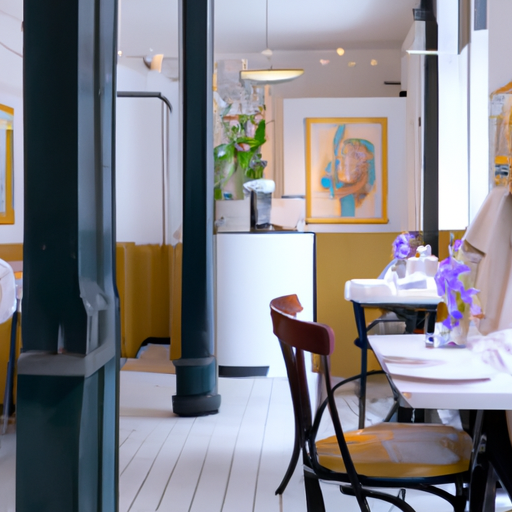
Streamlining Check-In and Check-Out Processes with Digital Solutions
Are you tired of waiting in long lines to check in and check out of your hotel? Do you wish there was a more efficient and convenient way to complete these processes? Well, you’re in luck! With the smooth digital transformation and non-disruptive innovations taking place in the hotel industry, streamlining check-in and check-out processes has become a reality.
Gone are the days of standing in line at the front desk, filling out paperwork, and waiting for your room key. Thanks to digital solutions, hotels are now able to offer a seamless check-in experience that saves you time and hassle. Imagine walking into the hotel lobby, being greeted by a friendly staff member, and within minutes, receiving your room key on your smartphone. This is now possible with mobile check-in.
Mobile check-in allows you to bypass the front desk altogether and go straight to your room. All you need to do is download the hotel’s app, enter your reservation details, and select your preferred room. Once you arrive at the hotel, you’ll receive a notification on your phone with your room number and a digital key. Simply tap your phone on the door lock, and voila! You’re in your room without any unnecessary delays.
But what about check-out? Well, digital solutions have revolutionized this process as well. With mobile check-out, you can settle your bill and leave the hotel without having to wait in line. Simply review your charges on the app, select your preferred payment method, and receive your receipt via email. It’s quick, convenient, and hassle-free.
Not only do these digital solutions enhance your hotel experience, but they also provide a more personalized touch. Hotels can use the data collected from mobile check-ins to tailor your stay to your preferences. For example, if you frequently request extra pillows or a specific type of room, the hotel can ensure that these preferences are met before you even arrive. This level of personalization makes you feel valued and appreciated as a guest.
In addition to mobile check-in and check-out, hotels are also implementing other digital solutions to streamline the overall guest experience. For instance, self-service kiosks are becoming increasingly popular. These kiosks allow guests to check in, check out, and even make additional requests, such as room service or housekeeping, without having to interact with hotel staff. This not only saves time but also provides a sense of independence and control over your stay.
Furthermore, hotels are utilizing digital concierge services to provide guests with instant access to information and assistance. Whether you need recommendations for local attractions, want to book a restaurant reservation, or require help with any other request, a digital concierge is available 24/7 to assist you. This eliminates the need to wait in line at the front desk or make multiple phone calls, ensuring a seamless and efficient experience.
In conclusion, the smooth digital transformation and non-disruptive innovations in the hotel industry have revolutionized the check-in and check-out processes. With mobile check-in and check-out, self-service kiosks, and digital concierge services, hotels are able to provide a more efficient, convenient, and personalized experience for their guests. So, the next time you’re planning a trip, look for hotels that offer these digital solutions and enhance your stay from start to finish.
Personalizing Guest Experiences through AI and Machine Learning

In today’s fast-paced world, technology plays a crucial role in enhancing our everyday experiences. From ordering food to booking flights, digital transformation has revolutionized various industries, including the hospitality sector. Hotels are now leveraging the power of AI and machine learning to personalize guest experiences, making each stay memorable and unique.
Imagine walking into a hotel where the staff already knows your preferences, from the type of room you prefer to the amenities you enjoy. With AI and machine learning, this is no longer a distant dream. These technologies enable hotels to gather and analyze vast amounts of data about their guests, allowing them to create personalized experiences tailored to each individual.
One way hotels are personalizing guest experiences is through the use of chatbots. These intelligent virtual assistants are available 24/7, ready to assist guests with any queries or requests they may have. Whether it’s ordering room service, booking a spa appointment, or simply asking for recommendations on local attractions, chatbots provide instant and personalized responses, enhancing the overall guest experience.
Moreover, AI-powered chatbots can learn from each interaction, continuously improving their responses and understanding of guest preferences. This means that the more a guest interacts with the chatbot, the better it becomes at anticipating their needs and providing relevant recommendations. It’s like having a personal concierge at your fingertips, ensuring that every aspect of your stay is tailored to your liking.
Machine learning algorithms also play a significant role in personalizing guest experiences. By analyzing guest data, such as previous stays, preferences, and feedback, hotels can make intelligent recommendations and suggestions. For example, if a guest frequently stays in rooms with a view, the hotel can proactively offer them a room with a stunning vista during their next visit. This level of personalization not only makes guests feel valued but also enhances their overall satisfaction.
Another way hotels are leveraging AI and machine learning is through the use of smart room technology. Imagine walking into your room, and the lights automatically adjust to your preferred brightness, the temperature is set to your liking, and your favorite music is playing softly in the background. With smart room technology, this is now a reality. These systems use AI to learn guest preferences and adjust the room settings accordingly, creating a truly personalized and comfortable environment.
Furthermore, AI-powered voice assistants, such as Amazon’s Alexa or Google Assistant, are becoming increasingly common in hotel rooms. Guests can simply use voice commands to control various aspects of their room, from adjusting the temperature to ordering room service. This not only enhances convenience but also adds a touch of luxury to the overall hotel experience.
In conclusion, AI and machine learning are transforming the way hotels personalize guest experiences. From chatbots providing instant assistance to smart room technology adjusting settings to guest preferences, these innovations are revolutionizing the hospitality industry. By leveraging the power of technology, hotels can create memorable and unique experiences for each guest, ensuring their stay is nothing short of exceptional. So, the next time you check into a hotel, embrace the digital transformation and enjoy a truly personalized experience.
Enhancing Hotel Operations with IoT and Automation Technologies
Enhancing Hotel Operations with IoT and Automation Technologies
In today’s fast-paced world, technology plays a crucial role in enhancing various industries, and the hotel industry is no exception. With the advent of the Internet of Things (IoT) and automation technologies, hotels can now provide a seamless and enhanced experience to their guests. These technologies not only streamline operations but also improve efficiency and customer satisfaction.
One of the key benefits of IoT in the hotel industry is the ability to connect various devices and systems, allowing for real-time monitoring and control. For example, hotels can use IoT sensors to monitor energy consumption, temperature, and occupancy levels in rooms. This data can then be analyzed to optimize energy usage, improve guest comfort, and reduce costs. By automating these processes, hotels can ensure a comfortable and personalized experience for their guests while also being environmentally friendly.
Automation technologies also play a significant role in enhancing hotel operations. With the help of automation, hotels can streamline various tasks, such as check-in and check-out processes, room service requests, and housekeeping operations. By implementing self-check-in kiosks and mobile apps, hotels can reduce waiting times and provide a more convenient experience for their guests. Additionally, automation can help hotels manage inventory and supply chain processes more efficiently, ensuring that guests have access to the amenities they need when they need them.
Furthermore, automation technologies can also enhance security measures in hotels. With the integration of smart locks and access control systems, hotels can ensure that only authorized personnel and guests have access to certain areas. This not only improves security but also provides peace of mind to guests, knowing that their belongings are safe.
Another area where IoT and automation technologies can make a significant impact is in the management of hotel facilities. By using IoT sensors and automation systems, hotels can monitor and control various aspects of their facilities, such as lighting, HVAC systems, and water usage. This not only helps hotels reduce energy consumption and costs but also ensures a comfortable and pleasant environment for guests.
Moreover, these technologies can also enable hotels to offer personalized services to their guests. By collecting and analyzing data on guest preferences and behavior, hotels can tailor their services and offerings to meet individual needs. For example, hotels can use IoT devices to track guest preferences for room temperature, lighting, and entertainment options. This allows hotels to create a personalized experience for each guest, enhancing customer satisfaction and loyalty.
In conclusion, the integration of IoT and automation technologies in the hotel industry has revolutionized operations and enhanced the overall guest experience. From streamlining check-in processes to optimizing energy usage and providing personalized services, these technologies have become essential tools for hotels to stay competitive in today’s digital age. By embracing digital transformation and non-disruptive innovations, hotels can ensure a smooth and seamless experience for their guests, ultimately leading to increased customer satisfaction and loyalty.


